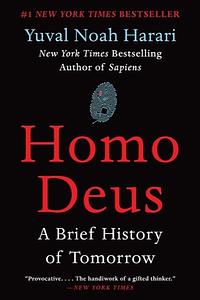Take a photo of a barcode or cover
informative
lighthearted
reflective
slow-paced
https://wordpress.com/post/boklaadan.wordpress.com/4867
challenging
informative
slow-paced
Every once in a while, a book really knocks my socks off, and this is one of those books. It asks the big questions, and it does so in a way that is easy to read and understand (meaning, you don't have to be an expert to read this....at the same time, it does not talk down to you in any way, so it is the best of both worlds). I was really excited to receive this book from Goodreads, because it asks the kinds of questions I myself wonder at - has humankind created a monster? (in terms of technology, etc); how do we really want to live? Where is this path leading us? Loved this book. It got me thinking, is intelligent, well-written, and timely.
informative
inspiring
medium-paced
challenging
informative
inspiring
reflective
relaxing
medium-paced
incredibly interesting book. As always Harari’s writing is amazing and thought-provoking and fairly assessable. Would absolutely recommend this book after Sapiens and they read more like a series and contain similar ideas. However, I would say a few of the topics require some prior information and understanding to get the most out of it.
I tried again, after abandoning this about 4 years ago but it's no use, it's just so dreadfully dull. I found myself making up excuses not to read. On the one hand, I hate admitting defeat, but on the other, the clothes I haven't worn for ages are now packed up & ready for the charity shop collection. Silver linings.
informative
reflective
fast-paced
Another thought-provoking book from Harari! I absolutely adored ‘Homo Sapiens’ - I personally found it more interesting than ‘Homo Deus’ as I’m not as interested in AI, algorithms, economic growth and politics as much as I should be perhaps, but I still wanted to know what he might speculate about the future.
I did very much enjoy reading how he dissects religion (how it came to be, why people keep believing, the difference between religion and a spiritual journey), plagues, famines, wars, modern threats to human life, how productivity doesn’t necessarily equal satisfaction, mental health and how we treat animals (and perhaps how future, upgraded humans may treat the homo sapiens that we know today).
I found that he was also much more light-hearted (at least in the beginning of the book) than he was in ‘Homo Sapiens’ which I appreciated, but in the same breath, towards the end of the book the vibes did become a little depressing (especially in the terms of global warming and the possible fate of modern humans), but he also does state multiple times that the book is not a prophecy but potential future possibilities.
Nevertheless, would recommend giving it a read and I’m glad I did!
I did very much enjoy reading how he dissects religion (how it came to be, why people keep believing, the difference between religion and a spiritual journey), plagues, famines, wars, modern threats to human life, how productivity doesn’t necessarily equal satisfaction, mental health and how we treat animals (and perhaps how future, upgraded humans may treat the homo sapiens that we know today).
I found that he was also much more light-hearted (at least in the beginning of the book) than he was in ‘Homo Sapiens’ which I appreciated, but in the same breath, towards the end of the book the vibes did become a little depressing (especially in the terms of global warming and the possible fate of modern humans), but he also does state multiple times that the book is not a prophecy but potential future possibilities.
Nevertheless, would recommend giving it a read and I’m glad I did!
informative
slow-paced
Харарі, напевно, хороший історик, проте він має тенденцію лізти в галузі, у яких не тямить. Так, з видом експерта він робить заяви на тему еволюційної біології, нейронауки, економіки, комп'ютерних наук.
Перша частина була більш-менш цікавою, коли йшлося про історію. Проте Харарі нібито має певний наратив, який хоче продати читачам, і через це він грішить спробами підмінити одні поняття іншими (наприклад, коли він намагається прирівняти релігію та політичні вподобання), будуванням аргументів на вигаданих діалогах, щедрим використанням аргументом слизького схилу («ага, ви користуєтеся навігатором у телефоні? тоді чекайте, що скоро комп'ютери голосуватимуть за вас на виборах») і загалом несерйозним ставленням до власних слів. Під кінець взагалі складалося враження, що в нього їде дах на ґрунті страху перед технологіями.
При цьому всьому він пише з таким тоном, ніби він єдиний має виважену думку щодо будь-якого питання, а всі інші (а саме науковці, дослідники, фахівці своєї галузі) не бачать нюансів. Це дуже дратує, я ледь змогла закінчити.
Перша частина була більш-менш цікавою, коли йшлося про історію. Проте Харарі нібито має певний наратив, який хоче продати читачам, і через це він грішить спробами підмінити одні поняття іншими (наприклад, коли він намагається прирівняти релігію та політичні вподобання), будуванням аргументів на вигаданих діалогах, щедрим використанням аргументом слизького схилу («ага, ви користуєтеся навігатором у телефоні? тоді чекайте, що скоро комп'ютери голосуватимуть за вас на виборах») і загалом несерйозним ставленням до власних слів. Під кінець взагалі складалося враження, що в нього їде дах на ґрунті страху перед технологіями.
При цьому всьому він пише з таким тоном, ніби він єдиний має виважену думку щодо будь-якого питання, а всі інші (а саме науковці, дослідники, фахівці своєї галузі) не бачать нюансів. Це дуже дратує, я ледь змогла закінчити.
informative
slow-paced
Almost stopped after introduction praised humanity for eliminating war and disease.. overall an interesting read with some interesting theories about where humanity may be heading. But at times felt like a book length shit-stirring blog post.






